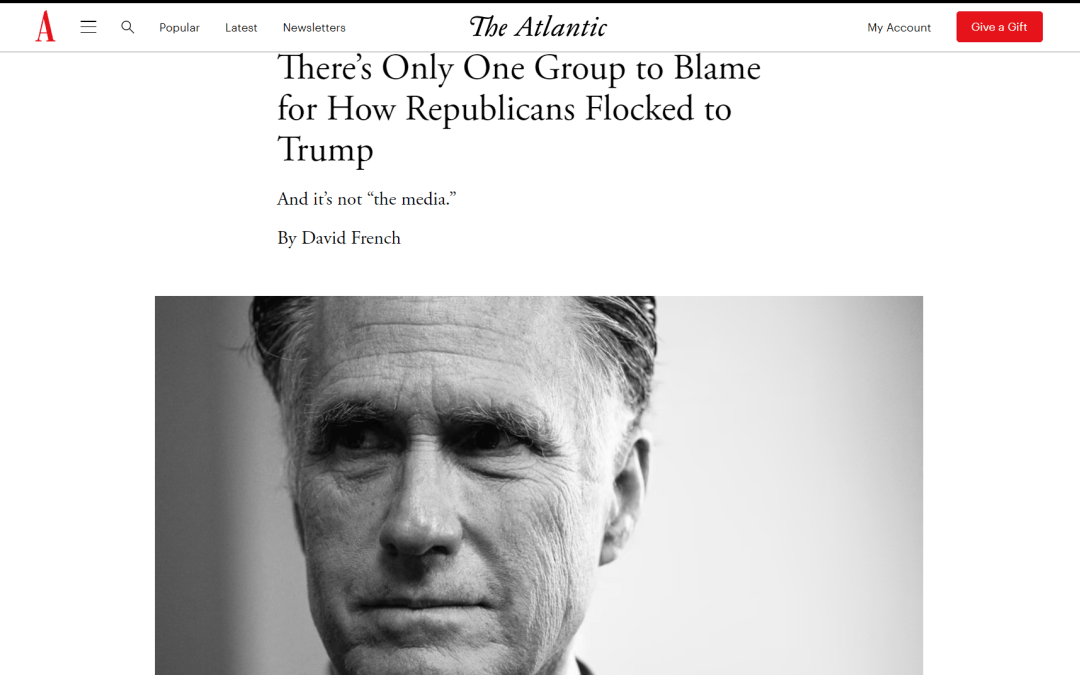
by Neville Buch | Oct 21, 2022 | Blog, Concepts in Religious Thought Series, What Is History Meaning?
David French’s article in The Atlantic (October 14, 2022) is an interesting analysis on ‘The Trump’ phenomena. French connects Trumpism to the Mitt Romney martyr thesis on events of 2012, and, behind that pattern of behaviour, a right-wing version of American evangelicalism. It had to do with the role of Newt Gingrich during a moment during the GOP primary debate, and his political frame of mind. The Gingrich argument goes that the news media is to blame for allegations against the operations of the Republican Party, i.e., dirty politics and unscrupulous use of partisan propaganda with little regard for truth in the current state of affairs.
“To understand the emotional and psychological aftermath of Romney’s loss, one has to look at the cultural break between the GOP establishment—which commissioned an ‘autopsy’ of the party in 2012 that called for greater efforts at inclusion—and a grassroots base that was convinced that it had been hoodwinked by party leaders into supporting the ‘safe’ candidate.”
This led to the grassroots radicalisation of the Republican Party, and the willingness to promote (false) ‘post-truth’ claims, on the basis that winning the partisan position should come at the cost of dumping truth claims for falsehoods.
This repositioning aligns to populist evangelicalism and its long-held anti-intellectualism. Half of the Evangelical world cares about truth, even inconvenient truths, and the other half does not.
This may be true in all filtered bubbles of cognition, however, the call here is that only Evangelicals will save their own position. It may take a reformation that translates as a formal division of the religious movement. This would be an adoption of a ‘new orthodoxy’ as was Reinhold Niebuhr’s Moral Man and Immoral Society (1932). My analytic judgement is that it is all heresy and the orthodox are not honest, or mislead, in positioning themselves as ‘new orthodoxy’.
However, that is the only solution if the right-wing does not step back from its extremism.
https://www.theatlantic.com/ideas/archive/2022/10/mitt-romney-gop-martyr-theory-trump-base/671725/
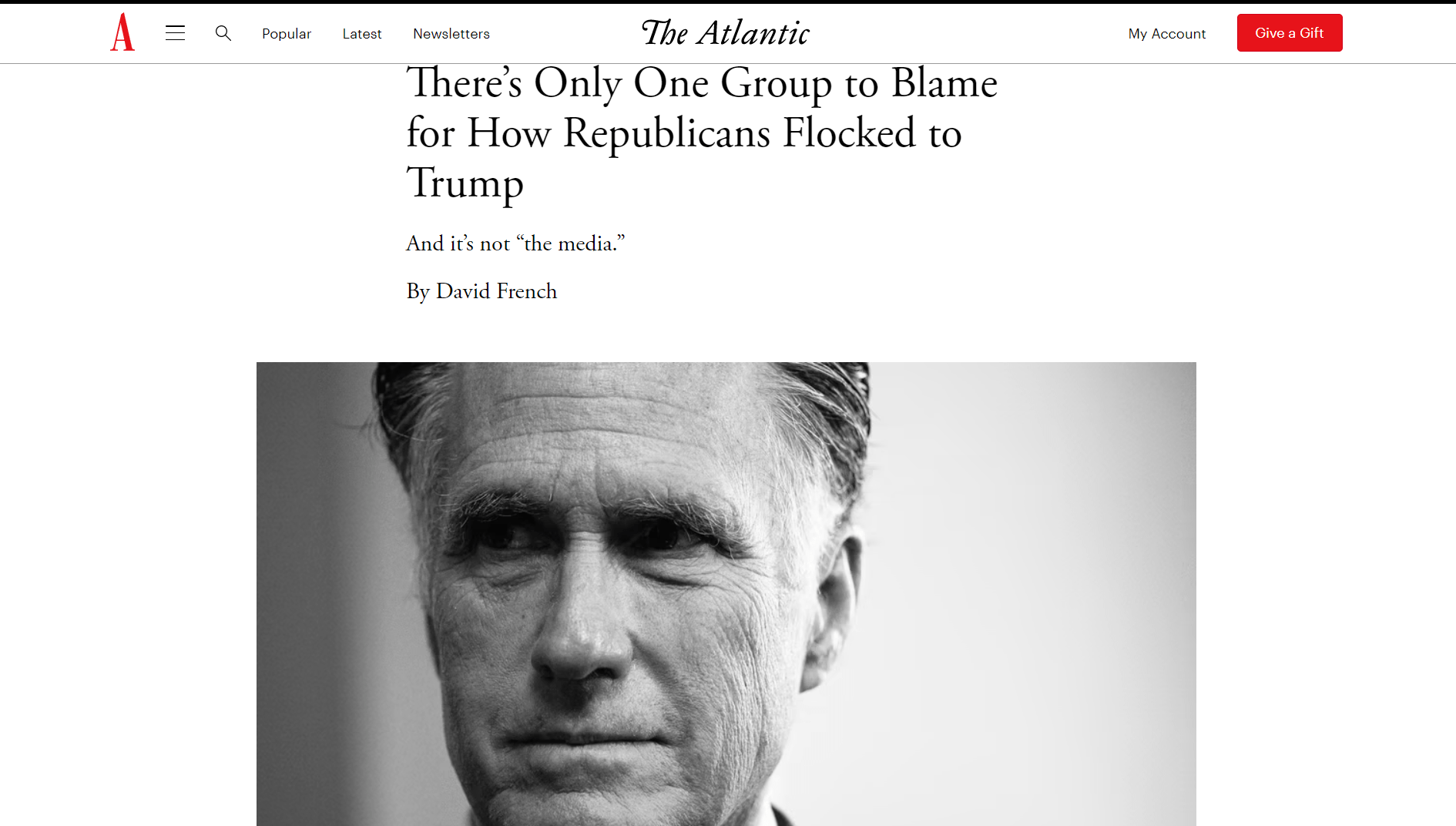
Image: David French’s online article in The Atlantic, OCTOBER 14, 2022.
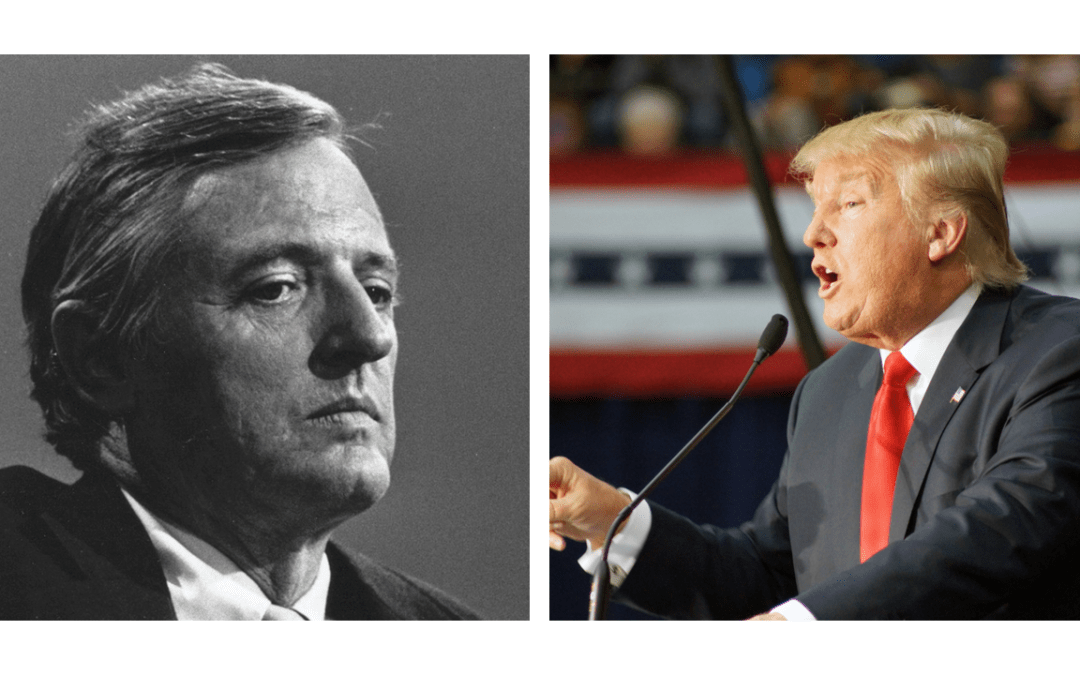
by Neville Buch | Feb 2, 2024 | Article, Blog, Concepts in Public History for Marketplace Dialogue, Intellectual History, The Importance Of History In Our Own Lives?
It amazes me that the reaction thinking can swallow up social movements into the madness of the mob. Yes, when layout on a spectrum, it is only a minority position, but, in which case, the reaction thinking becomes the majority outlook through the echo chamber of the techne.
We are doing the echo chamber now in this social media environment. But there is a difference between the minority of intellectuals and the mob position. So, it is estimated that Trumpism works on a quarter of the American population. A morality of a mob which is a minority on the spectrum of the American demography. As Richard Hofstadter showed, back in the early 1960s, in the course of American history, intellectuals were/are only a minority on the spectrum. What tends to occur is schooling of intellectuals.
Even with the intellectuals of the opposite position to our own intellectualism, it at least begins, with something less than reaction thinking we see today. For myself, for example, I am strongly opposed to the position of William F. Buckley Jr., and his American South neo-conservatism. However, I see in Buckley an intellectual position, in the 1960s, which could not be dismissed as reaction and mob thinking as Trumpism is in the 2020s.
Buckley’s earlier neo-conservativism work on a certain logic which has been skewed by Trumpism. Not x (liberalism) but y (a new conservatism). Make no mistake, though, in the context of the 1960s civil rights movement, Buckley was being reactionary, but being much smarter about it than the current mob. He formulated a new position for conservative thinking, one based on Southern State Rights and redescribed as “the Southern Way of Life“. This became the intellectual basis, over the four to five decades, to Trumpism, through the Moral Majority and the New Christian Right movements, and secularised during the late Bush administration into “Might is Right” (“USA, USA, USA“) movement.
The mob’s logic — all minority positions — is x = zero (liberalism offers nothing for me personally), so non-x (fascist thinking). Forgive my poor logic writing here. The better logicians are welcome to formulate the mathematical language in its better expression. But the point is historiographical solid. Historical forgetfulness leads a population into the spiral history theory of stupidity.
What is needed? Conversations and agreements to the compatibilism, as I have explained in my short piece, Finding Peace from the Culture-History War: A Historiographical Message for the Times.
My concern is that we have Buckley’s Chance to turn matters around, and we are trap on the spiral of eternal return (see links above, “the spiral history theory of stupidity”; each word here has a different link in the phrase, and the same with other phrasing above).
What humans need and want of life is Peace, if also Survival and Flourishing. This is what we have to keep foremost to Mind.
https://www.academia.edu/50114448/Finding_Peace_from_the_Culture_History_War_A_Historiographical_Message_for_the_Times
Featured Image:
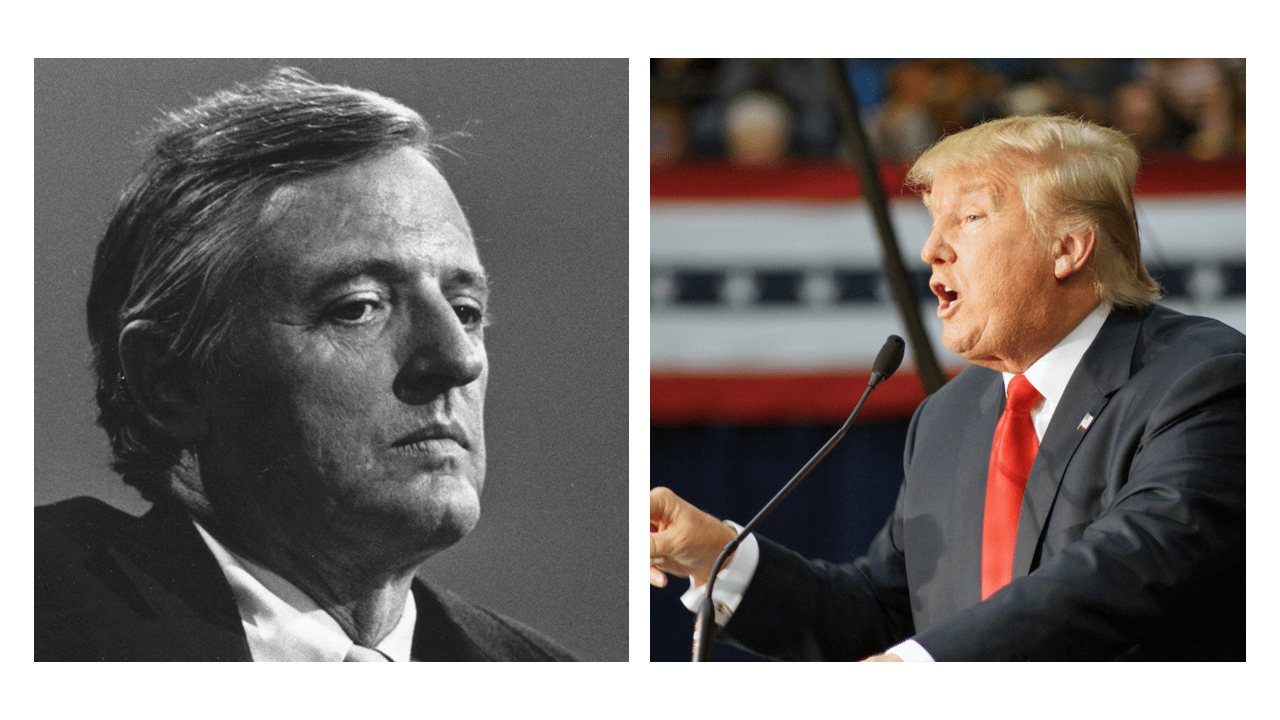
Unknown photographer – “William F. Buckley Jr., The Art of Fiction No. 146” in The Paris Review. From Wikipedia.
https://www.theparisreview.org/interviews/1395/the-art-of-fiction-no-146-william-f-buckley-jr The photograph was originally published online by Reuters/National Review in 2008 and guaranteed free non-commercial use; further information can be seen in the metadata. However, as a handout photo originally, it almost certainly emerged in the 1970s with no evident copyright notice, hence the chosen licensing information.
National Review Magazine founder William F. Buckley Jr. is seen in an undated handout photo.
Donald Trump speaks to record crowds at the Prairie Capital Convention Center in Springfield, IL on November 9th, 2015. Photo 62076674 | Donald Trump © Tommy Jeffers | Dreamstime.com

by Neville Buch | Apr 5, 2024 | American-Australian Relational History, Concepts in Educationalist Thought Series, Essay for Social Change
In the 2021 Australian and New Zealand History of Education Society (ANZHES) paper,
Lived higher education policy and grand generational narratives at the University of Melbourne 2005-2008: An educational critique of Karl Mannheim and ‘The Problem of Generations’,
I had stated that:
“Today, personal history is a credible field of scholarship. My argument as a philosophic historian is that Personalism is a better approach in analysis and policy formation than the generational analysis used in the design of the Melbourne Curriculum. Personalism is the intellectual stance that emphasizes the importance for the place of human persons. It is a philosophical movement of two hundred years with Russian Orthodox, French Existential, Polish Catholic, American Protestant and British Idealist histories. Institutions have used generational analysis to mask the personifying effects of political decisions in educational reforms.”
…
“The new generation degrees combined the drivers of higher education, the ideals, or virtues of the public university, but ultimately, at the end of the process, the expectations were what the new generation would need as an education to be productive citizens of the future.”
“The foundational work of Karl Mannheim comes into the creation of the generational framing of educational policy because of what he laid out as the principles of generational analysis. He took a positivist worldview, not a personable one, and argued that generation follows generation at regular intervals and with mechanical features. He clearly stated that when a person reached the age of 60, they were not educationally productive. The generational analysis defies the principles of lifelong learning, but sociologically it misses the continuing historical threads in learning, which is taken up or rejected across each new generation. Transgenerational revaluation is lost in such policy formation. Mannheim’s critics have loomed large, including Paul Ricoeur.”
“In our own time, the generational work has degenerated in the American pop sociology texts from Neil Howe and William Strauss.”
“Generational analysis took hold of the Melbourne New Generation vision in subtle and conflicting ways. On one side, the Vice-Chancellor had arguments of alternative generational analysis: Aristotle’s ethics and politics, Marcel Proust’s In Search of Lost Time, and Evelyn Waugh’s Brideshead Revisited. It was a personable argument of memory and generational nostalgia in relation to the virtues of the public university. Davis had compatibilist thinking, philosophically, and there was an attempt to bring an institutional healing from the disruption of privatisation. Davis was not an economic rationalist but a centrist in the public-private synergy debates, for example, the debate between John Cain and Alan Gilbert.”
“They already had, over the previous two decades, a corpus of generational analysis, degenerated into corporate speak. In the Howe and Strauss argument, by labelling a generation, you had the persona of the student cohort and, therefore, you had the answer to the type of admission program or loan program or career counselling program to implement.”
“Howe and Strauss are not systems sociologists, and their prejudices crossed different frames of understanding. There were two strong threads of old-style progressive conservatism and late 20th century neo-conservatism. You have in their work an American modernist reading of ‘Western-European’ thought. You can see much influence of William F. Buckley in defending a cultural-centric interpretation while appealing to republican virtues. Howe and Strauss generalise global and historical generations in the American local, moralistic, and Whig historiography, and their caricature generational narratives are presented as the cycles of history.”
“It should have been seen for its poverty of analysis among the Melbourne academics, but many academics do not have the education in sociology and history. One of the features of the Melbourne Curriculum was to remedy that problem for the new generation of academics. Furthermore, the sociological studies of the Millennials made it difficult to challenge the rhetoric. At Melbourne the governments’ expectation for a job-ready generation was confused, however, the optimism for young people made it hard to unpack the political rhetoric. The hope of the older generations was that the children would make a better world.”
“The generation narrative is shaped in one of two transgenerational directions, as utilitarian values, or rational-natural ends in themselves – as in Aristotelian holistic flourishing or the transcendental ends in a Kantian humanism.”
“Look to the personable characteristics of all those involved in producing the Melbourne Curriculum. Davis’ argument about the drivers of higher education had greater explanation value than descriptions of what the new generation’s education requirements are going to be. Davis was the national key figure in the public service reform movement from his time with the Queensland Government, during the post-Joh Bjelke-Petersen era. He was part of the neo-liberal thinking of the 1990s, but he had a unique take, different from the Penington and Gilbert generation.”
“The generational analysis generally gets it wrong or cannot grasps the eventuality of the future. The Melbourne Curriculum was a product rather of the personal beliefs shared among the University’s leadership.”
Isaac Arnsdorf has just published, Finish What We Started: The MAGA Movement’s Ground War to End Democracy (2024). He produced an excerpt from the book, on April 4, 2024, entitled, “How Steve Bannon guided the MAGA movement’s rebound from Jan. 6”:
“Bannon especially liked the version of this theory in “The Fourth Turning,” a 1997 book by historians Neil Howe and William Strauss, which ordered American history into generation‐long periods of highs, awakenings, unravelings and crises. The book predicted a coming rise of nationalism and authoritarianism, across the world and in America.”
“Bannon was not merely a student or passive observer of this prophecy; he wanted to be an agent of it, and an architect of the era that came next. So, when he watched Trump glide down a golden escalator to announce his campaign for president, in 2015, his first thought was, “That’s Hitler!” By that he meant someone who intuitively understood the aesthetics of power, as in Nazi propaganda films. He saw in Trump someone who could viscerally connect with the general angst that Bannon was roiling and make himself a vessel for Americans’ grievances and desires.”
There is a deliberateness there. American and Australian sociology and history is different, but there is something of this thinking in our Australian university councils and senates, in our bureaucracies, and in our cabinet room. It is, though, covert, in that views are not openly stated. In that regard, it is not a conspiracy. It is only that persons are conditioned to blame the establishment position when marginalisation occurs, such as educationalist theories and sociological models. In the twist of politics, this dismissal mindset includes the establishment itself. Governments find it easier to stick to the status quo, while at the same time, mourn the establishment position.
A mistake, though, is not to see the local phenomenon, connected, all the way up, regional, national, and global. In 1968 an unknown author wrote “The Uses of State and Local History”, in History News (Vol. 23, No. 12 December, 1968, pp. 233-242). In my review of the academic article, I wrote:
“In the last thirty years local and family history has developed as a cottage industry, for Queensland, as elsewhere in the world. The great difficulty for scholarly historians is that until recently amateur historians – those with no tertiary education in the discipline – controlled the field. Today, the industry – which includes wide ranging fields of, not only local and family history, but also heritage, museum curation, urban archaeology, and librarianship – is a strange mixture of voluntary and professional labour. Boundaries are much more fluid between amateur and professional roles, as well as between the roles of different professionals. If the educative value continues to mean something significant in society, and if history is to continue as something substantive in scholarship, leadership in a history-orientated industry must be in the hands of those historians trained as scholars – at the very least, at the level of four-year (honours) university degree. This also requires such historians, or such apprenticed historians in the midst of their pre-accredited training, to gain work experience in the marketplace, one that is at once regulated and unregulated.”
“Traditionally, it has been an unregulated scholarly market organised by the Royal Historical Society of Queensland, as the peak body, with a few regional historical societies scattered across the state. University historians generally kept out of matters of local history, and struggled to make an impression in state history. The 1990s, in the wake of the Australian Bicentenary, changed market conditions. Unlike the Queensland centenary, academic historians – representing regulated, or accredited and peer-reviewed, scholarship – were much more to the fore in the commemorational events. Queensland academic historians, archetype by the two “Ross-es”, Ross Fitzgerald and Ross Johnston, led the charge into a resurgence of state history. Accompanying this regulated trend, was an unregulated explosion in the formation of local history groups.ii The production of books and paraphernalia in these groups became voluminous, but the quality of work was overall below the standard of regulated scholarship. A few exceptions were evident coming from those educated in the discipline.iii The self-justification in the way the new market operated was that local history groups had worked from community values where the requirements in scholarship were not relevant. However, the blind-sighted problem was that such production was not substantially history, but a production – more often a re-production – of urban myths and legend, built upon gossip, innuendo, and rumour. “History” which was substantially history required skilled judgement on primary source material, working in a framework of a knowledge-base in the discipline. If truth and accuracy are important conditions of social justice, local and state history needed to be written by educated and trained historians. Traditionally, amateur historians ignored issues of conflict and discrimination in their populist productions. The drivers of social reform and equity more often have been academic-based historians. Such an analysis does not equate knowledge and skills to ethical behaviour. Nevertheless, the desire to better one-self professionally can be the source in strengthening community values.”
The extensive quotations in this blog article are an explanation of how local-regional-global society has been changing in “the educational placements” and across the generations. If the professional work is to flourish, then the non-university professionals need to be paid for the work that the Australian universities are, currently, not doing.
Featured Image: The unpaid professional worker. Photo 156666797 © motortion | Dreamstime.com

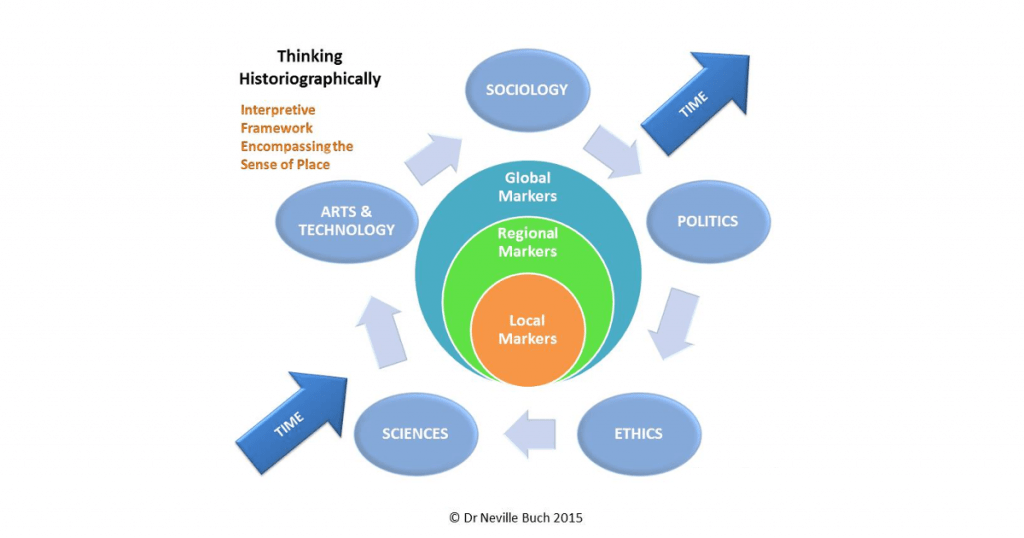
by Neville Buch | Jun 7, 2024 | Concepts in Public History for Marketplace Dialogue, Important Public Statement, Intellectual History
“… Last Friday, Salem Media Group announced that it had removed the fabulist film 2,000 Mules from its platform and said it would no longer distribute either the movie or an accompanying book by the right-wing activist and Trump-pardoned felon Dinesh D’Souza. It also issued an apology to Mark Andrews, a Georgia man whom the film had falsely depicted participating in a conspiracy to rig the 2020 election by using so-called mules to stuff ballot drop boxes. After being cleared of any wrongdoing by the Georgia Bureau of Investigation, Andrews filed a defamation lawsuit in 2022 against D’Souza, Salem, and two individuals associated with a group whose analysis heavily influenced the film.”
Ken Bensinger, ‘2,000 Mules’ Producer Apologizes to Man Depicted Committing Election Fraud, The New York Times, May 31, 2024

Graph: Thinking Historiographically 1024×538.
History spirals. There’re at least four main steps in the spiraling action.
1. Widely-Believed Falsehood:
Recently, we have seen the widely-believed falsehood in the the fabulist film 2,000 Mules. Films have been a platform of widely-believed falsehood since the beginning of Hollywood at the turn of the 20th century. In the last half century, though, films have become more bluntly politically-charged. The Washington’s Watergate-charged atmosphere of the 1970s, not ceasing from the late 1960s other American political intrigues, made the messaging very blunt. On the Left, was the later Emmy Awards-winner history drama TV movie, KENT STATE, 1970 (2023 Monarch Films). The film dramatization could not be done for a decade, so painful had the event been in American cultural life. The leftwing roots meant a romanticism which did not help to get an accurate historical sense for its present. On the Right, were the American 1970s evangelical apocalyptic movies. On the first uneducated glance, these films may not appear to be politically-charged. However, the pre-millennial message of A Thief in the Night (1972), A Distant Thunder (1978), Image of the Beast (1981), and The Prodigal Planet (1983) brought the themes of the Rapture and the Tribulation, where either politics was portrayed as a-politically irrelevant (itself a politically-charged message) or politics was portrayed as a secular government out to destroy the religion of the devout. The films were alarmist for the political agenda to destroy the leftwing (other) agendas of the late 1960s and 1970s. The falsehood was widely-believed but was always one large section of the society. In the United States it is estimated that supporters of Donald Trump is only one-fourth of the population. It estimated 30 to 35% (90 to 100 million people) are Evangelicals in the United States. Australia is not remotely distant to such widely-believed falsehood. Even as there has been significant resistance to Americanization in Australia, recent militant protests during the short era of the global pandemic shows a sizable section of the Australian population captive to far right narratives.
Ken Alder in an article called, “A Social History of Untruth: Lie Detection and Trust in Twentieth-Century America,” wrote:
…the efforts of twentieth-century American experts to oblige recalcitrant men and women to tell the truth about themselves. How different are these two enterprises [detecting lying and trust]? When Albert Einstein inscribed above his fireplace the motto, ‘‘Nature’s God is subtle, but He is not malicious,’’ he surely acknowledged as a corollary the possibility that people might be malicious, if also sometimes subtle. It is this latter corollary that has inspired the proponents of an American science of lie detection. Their premise is that while a human being may tell a conscious lie, that person’s body will ‘‘honestly’’ betray his or her awareness of this falsehood…(1-2)
2. Accountability:
There is accountability to teachers, mentors, supervisors, and others who guide us through life. Well, at least there once was. Accountability has undergone significantly challenges in the last six decades. On one level it is a perennial theme in “thumbing one’s nose,” not at authority, but each at their own sense of comprehensive responsibilities. Persons always “thumbing one’s nose at authority,” and that is healthy, if it is also not very effective. However, responsibilities that one’s owns is far more than the comfort that is given in the “freedom of speech.” To take responsibility, that is, to be accountable, rewards the person with integrity of being a person. In other words, it is normative mental health. The challenge is understanding “responsibilities that one’s owns.” Central to holding it together is the truth of the knowable and unknowable. The glue of integrity is knowable and it is also unknowable. Contrary to populist bullshitting, epistemology has not destroyed what we might designate as knowledge nor the capacity to know. Any technical epistemic justification, somewhere along the trees of argumentation, would be suffice. So, be accountable, and stop the bullshitting. Still, there are many matters which are unknown, and it is still undecided whether matters will ever be known (so, unknown). The glue chemistry for the unknowable is humility.
Jonathan Gorman in article called, “Historians and Their Duties,” wrote:
We need to specify what ethical responsibility historians, as historians, owe, and to whom. We should distinguish between natural duties and (non-natural) obligations, and recognize that historians’ ethical responsibility is of the latter kind. We can discover this responsibility by using the concept of “accountability“. Historical knowledge is central. Historians’ central ethical responsibility is that they ought to tell the objective truth. This is not a duty shared with everybody, for the right to truth varies with the audience. Being a historian is essentially a matter of searching for historical knowledge as part of a an obligation voluntarily undertaken to give truth to those who have a right to it. On a democratic understanding, people need and are entitled to an objective understanding of the historical processes in which they live. Factual knowledge and judgments of value are both required, whatever philosophical view we might have of the possibility of a principled distinction between them. Historians owe historical truth not only to the living but to the dead. Historians should judge when that is called for, but they should not distort historical facts. The rejection of postmodernism’s moralism does not free historians from moral duties. Historians and moral philosophers alike are able to make dispassionate moral judgments, but those who feel untrained should be educated in moral understanding. We must ensure the moral and social responsibility of historical knowledge. As philosophers of history, we need a rational reconstruction of moral judgments in history to help with this. [added emphasis]
3. Falsehood Retreats:
There are fools who argue that since perception is the mental filter we can never know truth from falsehood. There two basic reasons why this is a bullshit argument. First, perceptionism is not the opposite or disjuncture with Object-ism (not to be confused with Ayn Rand’s Objectivism). There are objects in the world, and we know that there are objects in the world by the fact of perception. It is perception that can tell us whether we have a true object perceived, or whether the ‘object’ is an illusion. Perception can lead to illusion in the mental reflection (i.e. the thought about the thought), thus, we have the falsehood. On the other hand (or in another direction of the brain firing), we can reasons ourselves to the truth from perception. The question is what truth is being established. For each truth proposition is relative to the other, until it networks out into a holism (Willard Van Orman Quine). Now, those who follow Rand “get very hot under the collar” at this point. However, Quine can help us out. He advocated a behaviorist theory of meaning which meant that the distinction between analytic and synthetic statements are defended ambiguously, undermining verificationism, and we have to retreat to behavioural judgements. For most epistemologists with the contemporary fallibilism, Quine’s critique is untroubling. Life, and knowing life, will always be ambiguous. The point is that Rand is very wrong in her Objectivism, we ‘know’ that we do not understand objects directly, otherwise nobody could even talk about perception. Quine helped by demonstrated that in stating ‘truth’ of analytic and synthetic statements we can never completely be there. Indeed, Quine is being inconsistent between his behaviouralist semantics and his scientific holism.
Now, there will be idiots who dismiss the above paragraph because it simply logic and epistemology, and not, as they proclaim, politics, history, or sociology. However, the above paragraph works perfectly well as political philosophy. An argument of falsehood might go like:
- There are those Right/Left persons who are all relative and cannot accept the Object in my politics;
- Such persons are confused in directly “perceiving” the Object;
- Conclusion — “I am right (correct) and they are wrong.”
W. Speed Hill in an article called, “Doctrine and Polity in Hooker’s ‘Laws’,” wrote:
If he is read today at all, Richard Hooker is read as the author of a single work, the massive treatise Of the Laws of Ecclesiastical Polity. Yet his other writings, if one includes Chapters iv-vi of Book vi, the “tract of confession” over which the dispute arose at Hooker’s death, amount to one-quarter of his extant work. Largely unexplored, they reveal the essentially inward bias of his mind, and they set forth, independently of the disciplinarian context of the Laws, the doctrinal assumptions that underlie its defense of established polity. From the perspective of these non-Polity writings, the Laws , for all its length, its wealth of illustrative detail, and meticulous argumentation, is simply an application in extenso of more general principles that Hooker enunciates elsewhere… But to see these doctrinal issues as Hooker himself saw them is to see the arguments of the Laws in a perspective nearer to Hooker’s own, one less colored by the pervasively controversial bias of his lay collaborators…[added emphasis]
4. Historical Forgetfulness:
In “Buckley’s Chance, Cultural Thinking of Trumpism, and History” I have stated:
The mob’s logic — all minority positions — is x = zero (liberalism offers nothing for me personally), so non-x (fascist thinking). Forgive my poor logic writing here. The better logicians are welcome to formulate the mathematical language in its better expression. But the point is historiographical solid. Historical forgetfulness leads a population into the spiral history theory of stupidity.
What is needed? Conversations and agreements to the compatibilism, as I have explained in my short piece, Finding Peace from the Culture-History War: A Historiographical Message for the Times.
My concern is that we have Buckley’s Chance to turn matters around, and we are trap on the spiral of eternal return (see links above, “the spiral history theory of stupidity”; each word here has a different link in the phrase, and the same with other phrasing above).
What humans need and want of life is Peace, if also Survival and Flourishing. This is what we have to keep foremost to Mind.
The last stage of the spiral is historical forgetfulness. And the cycle of the spiral begins again in the historical memory which is not re-discovery, as direct realism, but the shades of ideas brought back to a new life.
David Michael Kleinberg-Levin in an article called, “The Court of Justice: Heidegger’s Reflections on Anaximander,” wrote:
… In his commentary, Heidegger draws on Nietzsche’s thoughts about justice, the will to power, and nihilism to formulate an interpretation of the fragment that connects it to the epochal history and destiny of being. This “ontological” interpretation, constructed in a compelling reading of the history of philosophy, requires that Heidegger first address the historicism and “onto logical forgetfulness” prevailing in historical consciousness and historiography, in order to begin thinking towards the possibility of another epoch of being, releasing us from the injustice that is inherent in the ontology that rules in the present historical dispensation. Although Heidegger avoids moral prescription, he cannot avoid critical entanglement in the moral-juridical sense of justice, despite his claims and protestations, since, as his own account of the fragment implies, justice and ontology must be inseparable. Reading Heidegger’s commentary in relation to Benjamin’s philosophy of history, I argue that Heidegger’s reflections on justice suggest a narrative of tragic hope that resembles Benjamins configuration of justice in his reading of the Baroque mourning-play, where the hopelessly fragmented and imperiled image of justice is revealed as emerging from a Leidensgeschichte fatefully bound up in the continuum of a Schuldgeschichte [added emphasis]
Conclusion in Australian Intellectual Historiography
On the eternal returns, as an intellectual historian examining the previous era of 1945-1985, we find, in the revaluations (Nietzsche’s perceptionism reconsidered), that Manning Clark and Donald Horne, from the two ends of the political spectrum, had already given us four stages of spiral historiography.
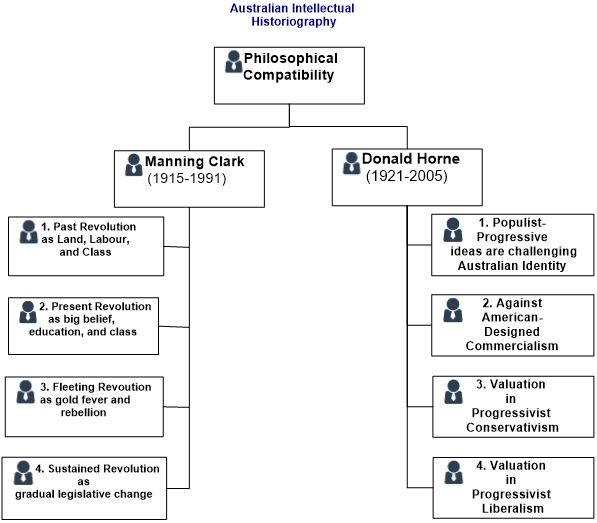
See, Progress and Popular Thinking in the United States & Australia 1945-2020, and, Geo-Political Debate in Australia: An American-Australian Relational (Intellectual-Cultural) Reading.
How stupid we are in not paying attention to the intellectual histories which just spiral around, a little forward, and a little retreat.
REFERENCES
Alder, K. (2002). A Social History of Untruth: Lie Detection and Trust in Twentieth-Century America. Representations, 80(1), 1–33. https://doi.org/10.1525/rep.2002.80.1.1
Gorman, J. (2004). Historians and Their Duties. History and Theory, 43(4), 103–117. http://www.jstor.org/stable/3590638
Hill, W. S. (1972). Doctrine and Polity in Hooker’s “Laws.” English Literary Renaissance, 2(2), 173–193. http://www.jstor.org/stable/43446757
Kleinberg-Levin, D. M. (2007). The Court of Justice: Heidegger’s Reflections on Anaximander. Research in Phenomenology, 37(3), 385–416. http://www.jstor.org/stable/24660579

by Neville Buch | Sep 16, 2024 | Concepts in Educationalist Thought Series, Important Public Statement
“The American media totally ignored this stuff until Donald Trump and I started talking about cat memes. If I have to create stories so that the American media actually pays attention to the suffering of the American people, then that’s what I’m going to do.” [spoken by J.D. Vance]
When the CNN host, Dana Bash, noted that he had used the word “creating,” Mr. Vance replied, “I say that we’re creating a story, meaning we’re creating the American media focusing on it.”
Maggie Astor, Vance Sticks By Pet-Eating Claims and Says He’s Willing to ‘Create Stories’, The New York Times, Sept. 15, 2024
Updated 1:20 p.m. ET.
In the biblical motif it is the ‘snake’ or ‘serpent’ that tempted Eve. If we took the biblical story literally there are serious problems we have in our modern world. But if the uneducated thinks that a person can avoid the literal problem by rejecting the modern belief system, as in dismissing it in total, they are ignorant of how much of their own thinking is actually modernly constructed (most of everyone’s thoughts in the present).
Each of the terms in the above sentence has or infers exact meaning, according to Semantics, what meaning is in language, and Hermeneutics, methodology of interpretation for texts usually but also non-verbal communication. These fields of education are also supported and enhanced by other fields of learning, such as Presuppositional Analysis (arguments conveying meaning), Semiotics (signs conveying meaning), and Exegesis (textual entries conveying true meaning). It was once presupposed by conservative scholars that these fields are the problem when attempting to defend a literal meaning. In some cases a literal meaning is true, and this is why ‘the dismissal‘ of past conservative scholars is plainly wrong in the other cases. Neo-conservative scholars, particularly Americans in the Heritage Foundation, have done everything to prevent faithful conservatives understanding this great distortion of conservative beliefs. The distortions arise in the problems identified in American cultural and intellectual history, and, in particular, anti-intellectualism or the politics of uncaring (cynicism).
These fields are the frameworks whereby we each determine what is a true meaning. Presuppositional Analysis demonstrates true meaning by demonstrating false meanings in fallacies. Semiotics demonstrates true meaning by demonstrating false meanings in memes (also a field of study called memetics). Exegesis demonstrates true meaning by demonstrating false meanings in how each might read a text. Hermeneutics demonstrates true meaning by demonstrating false meanings in secondary arguments, to falsely justify both literal and non-literal meaning, which have been soundly (as in logic) shown to be false. Semantics demonstrates true meaning by demonstrating false meanings in the primary framework of meaning. Hence, we have to be educated in the relevant frameworks of thinking:
Meaning (primary framework): In philosophy—more specifically, in its sub-fields semantics, semiotics, philosophy of language, metaphysics, and metasemantics—meaning “is a relationship between two sorts of things: signs and the kinds of things they intend, express, or signify”;
Constructionism: A framework which could be a reference to 1) an educational philosophy developed by Seymour Papert, 2) a theory of how social phenomena or objects of consciousness develop in social contexts, or 3) a conservative type of legal or constitutional interpretation. At its logical base is a view that meaning is never revelation, but always constructed by the person, as cognition;
Literalism: Used in different contexts, this framework is where most of the confusion exists in the thinking. The confusion is said (falsely) to be defeated by several faulty frameworks: dogma, deflection, and denial.
American Modernism: This is the framework that ends up promoting false literalist beliefs, both as materialist and non-materialist meanings. The faulty framework does this primarily by 1) naïvely rejecting past conventions without understanding the past, which leads to 2) opposing Historicism, which is to simply reject a process of studying the past, and 3) a popular and confused thinking in utopianism. All of these sub-frameworks of modernity contain many truths and many falsehoods;
Critical Realism (philosophy of the social sciences): a philosophical approach to understanding science, and in, particular, towards social science by opposing views of science as concerned with identifying causal mechanisms. Why this framework is important is that it destroys the application of direct realism to falsely justify an argument of literalism as “reality”;
Perception: A key framework which shows that the framework of naïve realism (also known as direct realism or perceptual realism) often does not work when attempting to secondarily justify a false argument.
So, to circle back to the lying of J.D. Vance, and Donald Trump; persons get away in intense lying by appealing to the plain ignorance of the uneducated, the opposite state of affairs of education, and, as well, the willfully ignorant, those professionals who should know better because they claim to be educated. Too often this state of affair is simply confusion in (originally) the Catholic theological distinction between vincible and invincible ignorance.
So, Why the Uneducated Believe Intense Liars? It is because the uneducated are uneducated. This is the very reason why militant rightwing believers, as uneducated or the willfully ignorant, want to hollow out the curricula of the humanities and social sciences of our education systems.
Featured Image: Young business man holding his two masks. ID 13298147 | Liar © Barelkodotcom | Dreamstime.com












